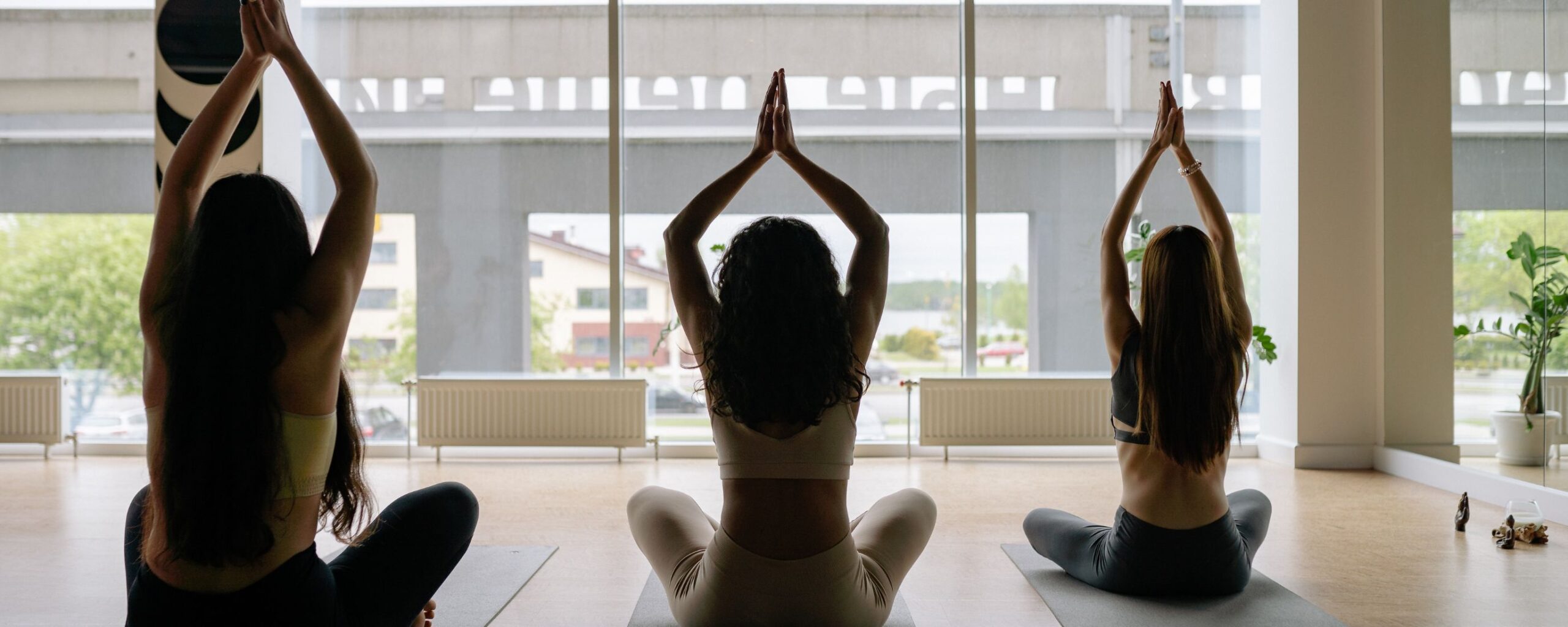In rehab and recovery, treatment is like a coin, or a yin and a yang, with both sides separate from, yet complementing, the other.
On one side, you have traditional research-based clinical psychotherapy, which has evolved to see scores of people successfully conquer their addictions or mental illnesses by helping them recognize and reconcile the connection between their thoughts, emotions, and behaviors.
On the other side, there’s holistic therapy, which also seeks to make a tangible link between the mind, the body, and the spirit through wellness-oriented approaches — each one playing a distinct role in your ability to recover. Research contends that holistic treatment also encompasses other important aspects core to our human condition, like the emotional, relational, and societal.
When both meet, a synergistic approach is created, one that’s recommended for many people in treatment. But what’s the process like at a holistic recovery center, and how does it foster a healthy mind, body, and spirit? If you’ve decided it’s time to take control of your mental health or kick drugs or alcohol to the curb, keep reading to learn how a holistic approach can make a difference in your recovery.
What Is a Holistic Recovery Center?
A holistic treatment center is a type of rehab facility that normally brings traditional and alternative treatment programs together under one roof. There’s space for conventional psychotherapy in individual and group settings, but bandwidth is also designed for other practices.
For instance, there might be dedicated studios for yoga, meditation, tai chi, art, or fitness classes, or rooms dedicated to aromatherapy, acupuncture, or massage. Depending on the center’s campus, there might even be a barn on the property with therapy horses.
Rehab centers that offer detox and rehab services will employ clinical staff like doctors, nurses, and therapists, ranging from licensed counselors to psychologists to psychiatrists. On the holistic end, you’ll get to meet and work with another team of diverse, compassionate specialists, including:
- Meditation, yoga, and tai chi instructors
- Massage therapists
- Sound therapy specialists
- Nutritional counselors
- Art and music therapists
- Biofeedback technicians
- Fitness coaches
Just like traditional talk therapy, where you’ll find a range of different treatment types, a holistic rehab center also makes sure to offer a wide mix of therapies, each one touching on a different aspect of recovery.
What Does Holistic Even Mean?
“Holistic” has roots in the Greek word holos, which translates to “whole.” Instead of addressing isolated symptoms or issues, holistic medicine is designed to treat you as a whole person and embraces how all the aspects of what makes you who you are — from your mind, your body, your emotions, and your spirit — are all interconnected.
How does this concept apply within the context of holistic mental health care?
For instance, depression can create a series of symptoms that take a toll on your mental outlook. You may be deeply saddened for no reason or feel hopeless or worthless, like you have no place in this world. Such a severe toll on your mental health can serve to weaken you physically, causing you to lose your appetite or feel constantly fatigued.
Or you might struggle with anxiety, your mind racing hyperactively from the past to the future, never in the present. Your body, under pressure from the constant stress this type of disorder can create. And although you can’t see it, there’s an abstract feeling of an energy, an essence, having been sapped from you.
Holistic depression treatment and holistic anxiety treatment work by treating all these factors together rather than individually. They embrace this interconnectedness through therapies that nurture multiple parts of your wellness.
The Importance of Treating the Mind, Body, and Spirit
Your mind, body, and spirit are intrinsically linked and united in more ways than one. And to ignore just one of these during treatment can compromise or hinder your ability to recover. True wellness cannot happen when one of those elements is unwell.
Think of the mind-body-spirit connection like a feedback loop. It can be in a linear fashion, where the state of one’s mind influences the health of one’s body and, subsequently, one’s spirit, and vice versa. Or it can be non-linear. Your spiritual health can play a role in your mental health, or your physical health can impact your mental condition.
For example:
- Mind: Your thoughts and emotional state craft a strong mental narrative — and what you think and feel affects your whole being. When you’re stressed or having negative thought patterns, it can trigger other physical symptoms like increased cortisol, muscle tension and disrupted sleep. On a higher level, it can all make you feel disconnected from your sense of purpose.
- Body: Mental health and addiction disorders can tax your physical health. In the latter, the body begins to crave a substance, creating a physical-psychological dependence where proper nutrition and chemical imbalances throughout the body can manifest. This physical struggle can make finding purpose or peace seem nearly impossible as you exist to acquire and take the drug.
- Spirit: Finding meaning and connection in a multitude of ways brings strength to all parts of our being, especially our minds and bodies. When you connect with something bigger than yourself — whatever that means for you — it helps calm anxious thoughts and changes how your body responds to symptoms. This sense of purpose gives you a reason to care for yourself physically and mentally.
Looking for quality treatment for substance abuse and mental health that’s also affordable? Aliya Health Group's treatment facilities accept most major insurance providers. Get a free insurance benefits check now!
Check Your CoverageWhat Can Holistic Recovery Centers Treat?
The beauty of holistic care is how the therapies overlap to help treat a wide range of issues that might bring you to a holistic recovery center:
Mental Health Disorders
One in five (20%) adults experience mental illness, and 1 in 20 a serious mental illness, each year, notes the National Alliance on Mental Illness, making the need for both traditional and holistic treatment so important. One of the invaluable benefits of holistic mental health care is that it’s integrative.
When you incorporate alternative approaches alongside clinical practices like Cognitive-Behavioral Therapy (CBT) and others, your therapists can work to uncover different aspects of a certain mental health condition that may emerge, fitting together like a puzzle to paint a more complete picture.
At a holistic recovery center, mental health treatment might take shape in three ways:
- Holistic depression treatment involves practices that lift the fog or open the shades of depression to let light and clarity in. Your mood is boosted, and you’ll feel more energetic and alive, perhaps more than you have for years. The positive feel-good hormones from participating in holistic exercises may prompt you to adapt them into your lifestyle after treatment ends.
- Holistic anxiety treatment imparts a calming influence on an overactive, stressed mind. Activities that help you remain still in the present moment, without judgment or worry, not only relax the brain, but also the nervous system, your heart rate, and other physical symptoms that anxiety puts on overdrive. Most of all, they keep you grounded and stable when panic or fear may dominate; centered and confident when avoidance and phobias are common.
- Holistic trauma treatment is designed to help heal you from the deeply embedded scars that unresolved trauma can leave. Holistic approaches can help you process traumatic experiences safely, release stored tension, and rebuild a sense of safety and empowerment in yourself, especially when those feelings are hard to express verbally in words during talk therapy.
Substance Use Disorders
Addiction stemming from substance abuse reaches far and wide, regardless of the drug. According to the National Institute on Drug Abuse, 40.3 million people in the U.S. had a substance use disorder.
Part of what makes holistic care valuable is that it goes beyond the clinical aspects of managing withdrawal symptoms and aims to understand the underlying root causes of addiction. In many cases, it might be on account of other co-occurring conditions, like having a mental illness and substance use disorder at the same time.
The gentle nature of holistic therapy helps facilitate this process when you’re trying to make sense of difficult emotions, or the urges that drug or alcohol dependency brings, that can misalign your mind, body, and spirit connection.
What Happens During Holistic Recovery?
The most important thing to remember when you sign up for mental health or substance use disorder treatment is that your treatment plan is tailored and customized. It should follow the same integrative schedule and flow that balances clinical and holistic care so you can get the most out of recovery.
A typical day in treatment might see you first participate in an individual or group counseling session, then attend a yoga class or art therapy workshop. In your plan, you might find that after talk therapy, a meditation or hypnosis session might work well back-to-back. You might also meet a couple of times a week with a nutritional counselor. Depending on the holistic recovery center’s setting, there might be an opportunity for outside activities.
Get confidential help from our addiction and mental health treatment facilities located across the United States. Call to join one of our quality programs today!
Speak With Our Admissions TeamHolistic Mental Health Therapies
Mindfulness and Meditation
To know how effective holistic therapy can be is to see how it helps people succeed in treatment. A 2023 West Virginia University study found that people in recovery for opioid use disorder are more likely to follow through with their treatment, and less likely to relapse, when engaging in regular mindfulness meditation. “Mindfulness may improve a patient’s awareness of internal and external stimuli such as drug use triggers, so they can adapt and recognize them, and have more control over the outcome,” notes the report.
Meditation implores you to just sit and still your mind for a few minutes. Our minds naturally want to race from one thought to the next, but by being mindful to your thoughts and feelings as they come, you can observe them, without judgment, creating enough mental space between negative emotions — like when you feel triggered to have a drink, or a manic or depressive episode is coming on — so you can learn to hone your reactions to them.
Yoga
A practice rooted in ancient India, recent studies show the largest increases in the popularity of yoga than any other complementary holistic therapies, notes the U.S. Centers for Disease Control.
Yoga remains one of the therapies you can pursue at a holistic recovery center that truly fosters and strengthens your mind-body-spirit connection. Like a moving form of meditation, yoga teaches you to cultivate better mind-body awareness. When you hold a pose (also known as an asana), you’re fully engaged in the present moment. Concentrate on your breathing, or pranayama. Focus on the tension in your body and negative thoughts that may arise. Release those negativities on the next asana as you exhale. You’ll find after a regular yogic practice, you start becoming physically, mentally and spiritually stronger and fortified.
Equine Therapy
Addiction and mental health struggles can disconnect us from the people, the places, and the things that were once priorities. Someone with a crippling drug dependency may begin isolating themselves from others when trying to self-medicate. Depression can draw you away from the people and activities you love. And your self-esteem and confidence can suffer as a consequence.
Equine therapy is one holistic method that seeks to restore the loss of these traits that can fall by the wayside in the wake of substance abuse or mental illness. Horses are sensitive to human touch and provide immediate, honest feedback on your energy and behavior. The bond you build with a therapy horse can help you rebuild your communication skills, your self-awareness, and your sense of trust in others.
Expressive Arts Therapy
Can holistic anxiety treatment and holistic trauma treatment be as simple as picking up a sketch pen, a paintbrush, or a musical instrument, or singing or dancing the emotions that might be hard to verbalize? Statistics show that art therapy imparts a host of benefits, from reducing anxiety and PTSD symptoms to boosting self-esteem and improving communication skills and overall psychological well-being.
The good news about expressive arts therapy is that no artistic talent or experience is required — when you’re in treatment and sitting in front of a blank canvas or the first page of a journal, the focus is on the process of creation rather than the final product. And you never know what new talents you may uncover along the way that you can continue to make a part of your life after you’ve completed your time in rehab.
Acupuncture
Remember that traditional and holistic therapies are complementary practices — so much so that your psychologist or counselor will advocate for the progress you make in alternative treatment to augment the work you do in talk therapy. Case in point: studies indicate that many clinicians recommend practices like acupuncture for its ability to reduce anxiety levels and depression, sometimes proving more effective than medicine.
The ancient Chinese medicine practice involves inserting thin needles at specific points on the body to balance your qi, or energy flow. In a holistic recovery facility, acupuncture might be used in tandem while you’re going through detox and navigating withdrawal symptoms, or alongside other holistic treatments like yoga or meditation.
Hypnosis
Notice how remaining mindful of your thoughts, your emotions, and your cravings is a common thread in holistic therapy. Hypnosis therapy enables you to go even further by tapping into your subconscious mind, a meditative type of state where you and your therapist can unearth symptoms of trauma or feelings and memories that have been deep-seated or repressed.
In the hands of a trained therapist at a holistic treatment facility, hypnosis can help you on your journey for overcoming anxiety or alcohol use disorder since it helps to reframe the negative thinking and rewire the neurological connections that alcoholism and drug abuse can change in the brain — replacing them with newer, healthier thought patterns and motivate you to get sober.
Sound Healing
If you’ve signed up for meditation or yoga, you’ll remember how the instructor may ask you to close your eyes before beginning, and then, at the sound of a small gong, the session begins. The gentle strike and drone of a Tibetan singing bowl may accompany the stillness as the high-pitched twang of a tuning fork ends the session.
Sound healing takes these Eastern-based auditory techniques and makes it its own form of treatment, employing specific frequencies, vibrations, and tones that can have a positive effect on brainwave patterns. In sound therapy, you might lie comfortably while your therapist creates soundscapes around you, allowing the vibrations to move through your body. These resonant frequencies help shift your brainwaves from higher-stress alpha patterns to more relaxed beta and theta states, with the goal of calming the nervous system when addiction or anxiety takes hold.
What Are the Benefits of Holistic Rehab?
Few other types of addiction/mental health treatments address the mind, body, and spirit from all angles, in all ways. That means by treating you as a whole person, from your cursory symptoms down to nurturing the very essence of who you are as an individual, you can conquer your symptoms, address the underlying, root causes of mental health or addiction and promote healing from the inside out — and vice versa. Holistic treatment at a holistic recovery facility is meant to empower you to be your best, most complete self.
When you enter treatment and combine psychotherapy with holistic approaches, the goal is to help you mitigate your symptoms, change your relationship with drugs and alcohol, or reframe a negative mental story, but holistic treatments, one by one or in unison, are designed to give you a greater sense of purpose, mental and physical acuity and spiritual connection. It’s an opportunity to address all aspects of your health in a total, integrated way.
Holistic Mental Health Treatment Near Me
To make sure a professional mental health provider offers a high level of mental health and addiction treatments, first confirm that it provides services for both. Next, check to see how many different therapies the facility provides. A range of behavioral and trauma-based therapies ensures that there’s a treatment type that fits your needs, from inpatient to outpatient, aftercare, and more.
The right provider should also operate as a holistic rehab center with a host of complementary therapies that align with your values. The staff should be credentialed and licensed, and the center should work with you to determine your insurance coverage and payment plans.
Moreover, what is the facility’s philosophy? Aliya Health Group’s clinical promise is rooted in our own holistic approach that integrates research-based care with a compassion that cares for you as a whole person in your recovery journey. Let us help you on that path by contacting us today.
- https://www.psychologytoday.com/us/blog/leadership-diversity-and-wellness/202406/the-holistic-path-to-mental-health
- https://www.etymonline.com/word/holistic
- https://journalofethics.ama-assn.org/article/recognizing-mindbodyspirit-connection-medical-care/2009-10
- https://nida.nih.gov/about-nida/legislative-activities/budget-information/fiscal-year-2024-budget-information-congressional-justification-national-institute-drug-abuse/ic-fact-sheet-2024
- https://www.nami.org/about-mental-illness/mental-health-by-the-numbers/
- https://wvutoday.wvu.edu/stories/2023/11/15/wvu-research-shows-mindfulness-may-improve-substance-use-treatment
- https://www.cdc.gov/nchs/data/databriefs/db501.pdf
- https://paulickreport.com/horse-care-category/sensitive-souls-study-shows-therapy-horses-more-tender-to-touch#:~:text=A%20new%20study%20has%20shown,this%2C%20including%20the%20horse’s%20demeanor.
- https://www.blackalphabet.org/post/the-compelling-impact-of-art-therapy-6-eye-opening-statistics
- https://www.nuhs.edu/why-psychiatrists-are-recommending-acupuncture-to-their-patients/
- https://pmc.ncbi.nlm.nih.gov/articles/PMC6130927/#:~:text=The%20beta%20rhythm%20is%20usually,compromised%20cortical%20functions%20(5).








